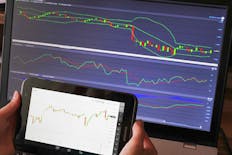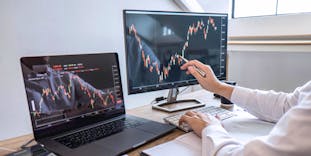The Best Futures Trading Courses of 2026 – According to Our Market Experts
All products and services featured are independently selected by WikiJob. When you register or purchase through links on this page, we may earn a commission.
Whether you’re starting out in futures trading or looking to expand your skill set, there are plenty of futures trading courses out there to help you on your journey.
In this article we review six of the best courses available and offer guidance on how to choose the right one for your circumstances.
7 Best Futures Trading Courses
1. Asia Forex Mentor – One Core Program
Pros
- Comprehensive curriculum available on demand
- Lifetime access to course content
- Free trial available
Cons
- No live session or mentoring
- No trading community access
Cost: One-off payment of $940. There’s also the option of a seven-day trial with free cancellation, but this ups the price to $997.
The Asia Forex Mentor One Core Program is designed and delivered by experienced and successful trader, Ezekiel Chew.
While Chew’s primary area of expertise is in forex, course content equips students with the knowledge needed to trade in any asset available on the futures market.
Futures trading classes take the form of pre-recorded videos available on demand. There are 63 of these videos in total, each lasting between 10 and 20 minutes with a combined course time of around 19 hours.
Topics covered include trading basics, chart reading, fundamental analysis, trade management methods and trading psychology.
A standout feature of the One Core Program is lifetime access to course materials. This means students can revisit the content and continue learning after completing the initial course.
Visit Asia Forex Mentor – One Core Program
2. Pepperstone
Pros
- Extensively regulated
- No minimum deposit
- Low fees and mostly free withdrawals
- Good customer service
Cons
- No investor protection for clients outside UK, EU and EEA
- Withdrawal fee for international bank wires
- CFDs only
Pepperstone is renowned for its comprehensive educational resources, which include some of the best futures trading courses available. These courses are designed to cater to both novice and experienced traders, offering valuable insights into futures trading strategies, risk management, and market analysis.
Pepperstone offers regular webinars and live trading sessions hosted by industry experts. These sessions cover a wide range of topics, including futures trading strategies, technical analysis, market trends, and trading psychology. The interactive format allows participants to ask questions and engage directly with the instructors, making it a valuable learning experience.
Pepperstone provides detailed tutorials and guides on futures trading. These resources cover everything from the basics of futures contracts and market mechanics to advanced trading strategies and risk management techniques. The tutorials are designed to be accessible for traders at all levels, ensuring that everyone can benefit from the information provided.
Pepperstone's market analysis and research section is an invaluable resource for futures traders. The broker offers daily and weekly market reports, technical analysis, and insights into market trends. This information helps traders make informed decisions and stay updated with the latest market developments.
Pepperstone's Trading Academy is a structured learning program that includes a series of courses on various aspects of trading. The academy covers a wide range of topics, from the fundamentals of futures trading to advanced technical and fundamental analysis.
The courses are designed to be comprehensive, providing traders with the knowledge and skills they need to succeed in the futures markets.
Understanding and managing risk is crucial in futures trading. Pepperstone offers extensive resources on risk management, including webinars, articles, and practical tools like stop-loss and take-profit orders. These resources help traders develop effective risk management strategies to protect their capital and minimize losses.
3. AvaTrade
Pros
- Comprehensive range of topics
- Accessible online format
- Variety of learning materials
- Practical application
- Free resources
Cons
- Limited interactive learning
- Generalized content
- Self-discipline required
The futures trading courses at AvaTrade would typically cover the basics of futures contracts, including:
- What futures are & how they work
- The key terminology associated with futures trading
Advanced topics might include strategies for trading futures, technical and fundamental analysis specific to futures markets, and risk management techniques.
AvaTrade’s educational resources are generally offered online and might include a mix of written content (like articles and e-books), video tutorials and webinars.
This variety ensures that traders can access learning materials in a format that suits their preferences.
Webinars and possibly live trading sessions can be part of the learning experience, offering real-time insights into futures markets, current trends, and trading strategies. These sessions often provide opportunities for interactive learning and Q&A with trading professionals.
The courses are likely to focus on the practical aspects of futures trading, such as how to use AvaTrade’s platforms to trade futures, understanding contract specifications, and managing trades effectively.
4. Bear Bull Traders
Pros
- Suitable for traders at various skill levels
- Incorporates live webinars for interactive learning
- Focuses on practical trading strategies
- Comprehensive curriculum with a step-by-step approach
Cons
- Limited advanced content for experienced traders
- No free trial available
Cost: Bear Bull Traders offers a Basic or Elite package priced at 99 and \199 per month respectively.
A well-known name in futures trading education, Bear Bull Traders was launched by experienced trader Andrew Aziz in 2016.
It offers a comprehensive course suitable for traders of all experience levels.
The course covers a wide array of essential topics such as technical analysis, risk management, trade execution and trading psychology, giving students a strong foundation in futures trading.
The combination of online modules and live webinars allows for a flexible learning experience, accommodating individuals with varying schedules.
One notable advantage of Bear Bull Traders is its focus on practical trading strategies.
The instructors emphasize real-time application, enabling students to put theory into practice effectively.
However, it's important to note that while this course is suitable for traders at different levels, it may not cater to advanced traders seeking highly specialized content.
5. Warrior Trading
Pros
- Suitable for both day and swing traders
- Emphasizes real-time trading and practical application
- Access to a community of traders for support
- Free futures trading course available
Cons
- Focuses primarily on day trading, which may not suit all traders
- Higher price point compared to some other courses
Cost: A one-time fee of $997 for Starter and $3,997 for Pro membership
Founded by trading expert Ross Cameron, Warrior Trading is a top futures trading course tailored for day and swing traders.
Pre-recorded lessons are available on demand, making it ideal for those who want to learn at their own pace.
With the Warrior Starter membership, students get access to beginner futures trading lessons covering the basics of trading platforms, tools and strategies.
Pro membership students are introduced to more complex topics including in-depth technical analysis and advanced strategies like gap and go, momentum and reversal trading.
In addition to video lessons, Warrior Trading offers resources like chat rooms, live trading demos and mentoring.
There's also a three-lesson free futures trading course for students who want the basics without committing to a membership.
6. Timothy Sykes Trading Program
Pros
- Plenty of free resources available
- Access to Timothy Sykes’s expertise
- Packages for both beginner and experienced traders
Cons
- Not suitable for traders interested in broader futures markets
- Lack of transparency on costs
Cost: Pennystocking Silver costs $149.95 per month. Prices for Tim’s Challenge are not advertised.
The Timothy Sykes Trading Program is tailored for traders interested in penny stock and small-cap trading within the futures market.
On the Timothy Sykes website there’s a vast library of trading guides and resources. These are free and cover the fundamentals of futures trading. There’s also the option to sign up to TIM Alerts, a subscription service offering real-time stock alerts and trade ideas.
For more advanced and guided futures trading training there are two options:
- Pennystocking Silver – A comprehensive educational program that includes over 8,000 video lessons, weekly futures trading classes and chat room access.
- Tim’s Challenge – An exclusive program with an advanced curriculum, live group mentoring, networking opportunities and access to Sykes’s top trading strategies.
Visit Timothy Sykes Trading Program

7. Udemy
Pros
- Large selection of courses to choose from
- Suitable for all experience levels
- Affordable pricing
- Self-paced learning
Cons
- Quality varies between courses
- No instructor or community support
Cost: Courses start at $19.99.
Udemy is a good option for those who want to explore the basics without committing to structured futures trading education.
Courses can be purchased for a one-off payment, which gives lifetime access to all course content.
This typically includes a mix of video lessons, articles and downloadable resources, so students can learn entirely at their own pace.
There are courses to suit all skill levels, from beginners exploring the basics of technical analysis to experienced traders looking to specialize in a specific market strategy.
However, it’s important to note that the quality of futures trading courses on Udemy can vary, as they are created by different instructors.
What Is a Futures Trading Course?
A futures trading course is an educational program designed to teach individuals about the intricacies of trading futures contracts.
Futures trading involves buying or selling standardized contracts to speculate on the future price of various assets, such as commodities, financial instruments or currencies.
These contracts obligate the buyer to purchase or the seller to sell the underlying asset at a predetermined price on a specified future date.
A futures trading course typically covers a wide range of topics related to futures trading, with the aim of equipping participants with the knowledge and skills needed to trade futures effectively.
Futures trading courses are available in various formats, including live webinars and online self-paced courses.
The format and content of a course may vary depending on the provider and the target audience, which can range from beginners to experienced traders.
Why Sign Up for Futures Trading Training?
Signing up for futures trading training can be a valuable investment, whether you’re just starting out in the world of futures trading or looking to enhance your existing trading skills.
-
Knowledge and education – Futures trading classes provide structured and comprehensive education on the fundamentals and intricacies of trading in futures markets. They cover topics such as technical analysis, chart patterns and trading strategies, equipping you with essential knowledge.
-
Skill development – These courses focus on practical skill development. They not only teach you theoretical concepts but also help you apply them in real-world trading scenarios. This hands-on experience is crucial for becoming a successful trader.
-
Risk management – Futures trading involves inherent risks, and understanding how to manage these risks is crucial. Courses often emphasize risk management strategies, helping you protect your capital and minimize potential losses.
-
Trading psychology – Many courses delve into the psychological aspects of trading. Understanding emotions, discipline and how to maintain a clear mindset during trading can significantly impact your success as a trader.
-
Access to experts – Enrolling in a reputable course often means gaining access to futures trading coaching from experienced instructors or mentors. These experts can provide valuable insights, answer questions and offer guidance tailored to your specific needs.
-
Community and networking – Some courses come with access to trading communities or forums. Interacting with other traders allows you to exchange ideas, strategies and experiences.
How to Choose Between Futures Trading Courses
Choosing between futures trading courses requires careful consideration and research.
Here are some key factors to consider and steps to take to ensure you pick the right course for your needs.
Step 1. Define Your Goals
Determine your trading goals and objectives. How you intend to trade and what you intend to trade in will dictate the specific futures trading training you need.
Step 2. Research the Course Provider
Consider factors such as their track record, industry reputation and the quality of their educational materials.
Step 3. Review Course Content
Make sure it covers the fundamentals of futures trading, including market mechanics, risk management, technical and fundamental analysis and trading strategies. The course should be comprehensive and tailored to your skill level, whether you're a beginner or an experienced trader.
Step 4. Check Instructor Credentials
Evaluate the qualifications and experience of the course instructors. They should have a deep understanding of the futures market and a successful trading track record.
Step 5. Read Student Reviews and Testimonials
These can provide insights into the course's effectiveness and the instructor's teaching style.
Step 6. Look For Interactive Learning
Determine whether the course offers interactive elements such as live trading sessions, simulations or access to a trading community. These features can enhance your learning experience.
Step 7. Compare Cost
Keep in mind that higher prices do not always equate to better quality. Consider the overall value you’ll receive for your investment.
Step 8. Consider Support and Resources
Check if the course provides ongoing support and access to trading tools, research materials and market data. Support can be crucial for your development as a trader.
Step 9. Look For Trial or Sample Content
Some course providers offer free trials, sample lessons or introductory materials. Take advantage of these opportunities to get a feel for the course content and teaching style before committing.
Step 10. Check For Red Flags
Be wary of courses that promise quick and guaranteed profits with little effort. Trading involves risk, and there are no shortcuts to success.
Step 11. Ask Questions
Reach out to the course provider or instructor with any questions or concerns you may have before enrolling.
The best way to learn futures trading is to start with a comprehensive futures trading course.
These courses typically cover topics like market fundamentals, technical analysis, risk management and trading strategies.
Additionally, practice trading with a simulated account to gain hands-on experience without risking real capital.
Remember that patience, discipline and a solid understanding of market dynamics are key to success in this complex financial market.
Futures traders have the potential to make a significant amount of money, but success depends on various factors including skill, knowledge and risk management.
Some experienced and skilled futures traders can indeed earn substantial profits, while others may face losses.
It's a highly risky endeavor and not everyone achieves consistent profitability.
Futures trading can be a viable career for individuals with the right skills and mindset.
It offers the potential for profit, flexibility in terms of trading hours and the opportunity to work independently.
However, it's also a high-risk profession that requires a significant amount of dedication, continuous learning and the ability to handle stress and uncertainty.
Success is not guaranteed, and it’s a good idea to invest in futures trading education before pursuing a career in this field.
The [best platform for futures trading]/trading/forex/futures-trading-brokers) depends on individual preferences and needs.
Some popular options include TD Ameritrade, Interactive Brokers, NinjaTrader and TradeStation.
These platforms offer advanced charting tools, order execution capabilities and access to a wide range of futures contracts.
Consider factors like fees, tools and resources, as well as customer support when selecting a platform.
Trading futures typically requires a substantial amount of capital due to the leverage involved and the potential for significant losses.
While it is technically possible to open a futures position with as little as $100, it is highly risky and not advisable.
Most brokers have minimum account balance requirements, and trading with such a small amount would expose you to a high risk of losing your entire investment.
To engage in futures trading responsibly, it's recommended to have a more substantial capital base to manage risks effectively.
Trading futures is often tougher than trading stocks or other assets because of factors like strong leverage, complex contract terms, market volatility and the need for specialized knowledge.
Understanding contract details, dealing with market ups and downs and knowing your market well are all necessary.
The best futures trading courses will give you the knowledge you need here.
Futures and options both involve risk, but they have different risk profiles.
Futures contracts typically carry higher risk because they obligate traders to buy or sell the underlying asset at a predetermined price and date, potentially leading to substantial losses if market moves are unfavorable.
Options, on the other hand, provide the right but not the obligation to buy or sell, limiting potential losses to the premium paid.
Final Thoughts
Enrolling in futures trading courses can significantly improve your chances of becoming a successful and profitable trader.
These courses offer structured education, skill development, risk management strategies and access to experienced mentors and communities, all of which are invaluable resources on your trading journey.
The choice of a futures trading course should align with your specific trading goals and needs.
Take your time to research and select a course that offers the knowledge and support necessary to enhance your trading skills and increase your chances of success in the futures market.





